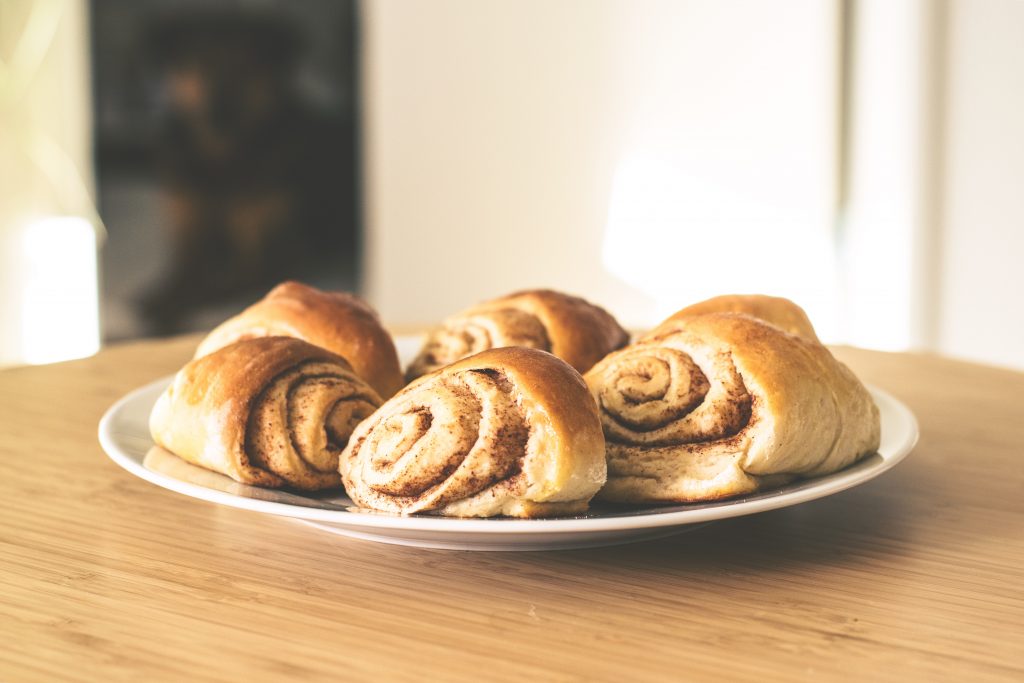CREATING TRADITIONS
On Christmas Eve, our family typically attends an early evening church service and then returns home for a not-so-traditional holiday meal of pizza and cupcakes. We have a quick birthday party for Jesus before setting out a plate of milk and cookies and tucking our boys into bed for the night.
On Christmas morning, we exchange gifts in our living room and then emerge from a pile of discarded wrapping paper and boxes to share a breakfast of homemade cinnamon rolls, bacon, and orange juice, just as I did when I was a child. These are our simple traditions.
While traditions can be fun, they can also be formative. It’s not always easy to see precisely how they shape us from one year to the next, but the Bible helps us understand how certain traditions can be instrumental in our spiritual development. When God set apart the people of Israel for himself, he put certain traditions at the center of their life together. And when Jesus set apart the church to be his witnesses in the world, he established a tradition that would bind them together around his death and the hope of his return.
ANCIENT TRADITIONS
To deliver his people from Egypt, God sent a series of plagues on Pharaoh and his country. The final plague was the plague of the firstborn: every firstborn son in Egypt would die. But God would pass over every firstborn son of Israel. God ordered that every Israelite family sacrifice a lamb and smear some of its blood across their doorframes. He told them, “The blood will be a sign for you on the houses where you are; and when I see the blood, I will pass over you” (Exodus 12:13).
And God wanted them to remember what he was going to do. So before the first Passover was even accomplished, God commanded his people to celebrate a Passover feast every year. Why? To honor the Lord for how he delivered the Israelites. But annually celebrating the Passover would have another purpose: to form the children of Israel around the story of their good God.
Through Moses, God told them, “And when your children ask you, “What does this ceremony mean to you?” then tell them, ‘It is the Passover to the LORD, who passed over the houses of the Israelites in Egypt and spared our homes when he struck down the Egyptians” (Exodus 12:26-27).
OLD TRADITIONS WITH NEW MEANINGS
Before he died, Jesus celebrated a Passover feast with his disciples—to invite them once again to remember God’s faithfulness. But Jesus brought new meaning to the Passover feast when he broke the bread, shared the cup, and then submitted himself to a death that would break his body and spill his blood. Jesus’ blood would be enough to cause God’s final judgment to pass over all who would believe in him.
The Apostle Paul received this old tradition with new meaning. He told the Corinthians, “For I received from the Lord what I also passed on to you” (1 Corinthians 11:23). And he reminded them that whenever we gather around the Lord’s Table to share the bread and the cup in Communion, we also share the story of God. We “proclaim the Lord’s death until he comes” (1 Corinthians 1:26).
HOW TRADITIONS FORM US
Many of our Christmas traditions remind us of the story of God. When we light candles, we remember that Jesus, the light of the world, came to break into the darkness. When we exchange gifts, we reflect how God graciously gave us his Son. Even in our shared meals—whether or not they contain a turkey—we point to the welcome of God in the simple practice of fellowship. Every tradition, every symbol big or small, allows us an opportunity to invite others into the story of God.
Every tradition, every symbol big or small, allows us an opportunity to invite others into the story of God.
In his book, You Are What You Love, James K.A. Smith reflects on the formative power of the practices and traditions in his household. He writes, “Family worship will be formative to the extent that it taps into our imagination, not just our intellect. To do so, worship needs to traffic in the aesthetic currency of the imagination—story, poetry, music, symbols, and images….There is a physicality to such household worship that encourages us to understand the gospel anew, in ways that endure in our imagination and thus shape how we make our way in the world” (p. 129).
The symbols and the rituals–the unleavened bread, the Passover sacrifice, taking the bread, taking the cup–invite us to participate in the story with our whole selves. We do not merely hear the story told, we touch it, we taste it, we re-enact it. The story becomes imprinted on our hearts and minds because it engages our senses, our emotions, and our intellect.
So many of our traditions shape us through what they symbolize. When we don’t understand a symbol or a ritual, we naturally ask someone older or wiser, “What does this mean?” When our symbols point to Christ and to his work in the world, we have the opportunity to share the story of God, the story of the Gospel.
NOTICING OUR TRADITIONS
Too often, we take our traditions for granted. We do them because we’ve always done them. And we don’t notice how central they have become until they’re gone.
When I was in high school, my parents decided that we would spend Christmas break serving Christmas dinner and distributing gifts to children in Jamaica. My sister and I selfishly protested because that meant we wouldn’t spend Christmas with our extended family. No turkey. No ham. No dressing, sweet potato casserole, or creamed corn. None of Nanny’s slightly-overbaked-but-still-perfect sugar cookies. At that moment, I felt the value of our family traditions in a new way.
And then there was last year, the year when I sat at home in a Norco-induced haze on Christmas Eve, recovering from an emergency surgery two days earlier. I missed our Christmas Eve service. I missed standing in a circle around the worship center and passing the light from one candle to the next. I missed looking at softly illumined faces as we sang “Silent Night.” We didn’t have pizza and cupcakes for dinner. My children missed the cinnamon rolls, the orange juice, and the bacon.

But when they missed our traditions, when months later they asked, “Why didn’t we have cinnamon rolls last Christmas?” I knew that our traditions were somehow forming them and forming our family. When I missed the Christmas Eve service at church, I knew that the annual practice of looking at my church family as I prayed, “Sleep in heavenly peace,” had formed me.
Our family traditions form us as do the traditions we share as a church. When we light the Advent candles, sing our favorite carols, when we take the bread and dip it in the cup, we remember what God has done and look forward to what God will do. And, by his Spirit, God creates a community centered on his story.
This holiday season, let’s pay attention to our old traditions and, perhaps, start some new ones. Let’s create opportunities to tell others, “This is what it means.” Let’s fill our lives with rich symbols and repeated practices that point to a story greater than our own.
This article first appeared in the Winter 2019 edition of CONNECT Magazine, a publication of Christ Community Church.
